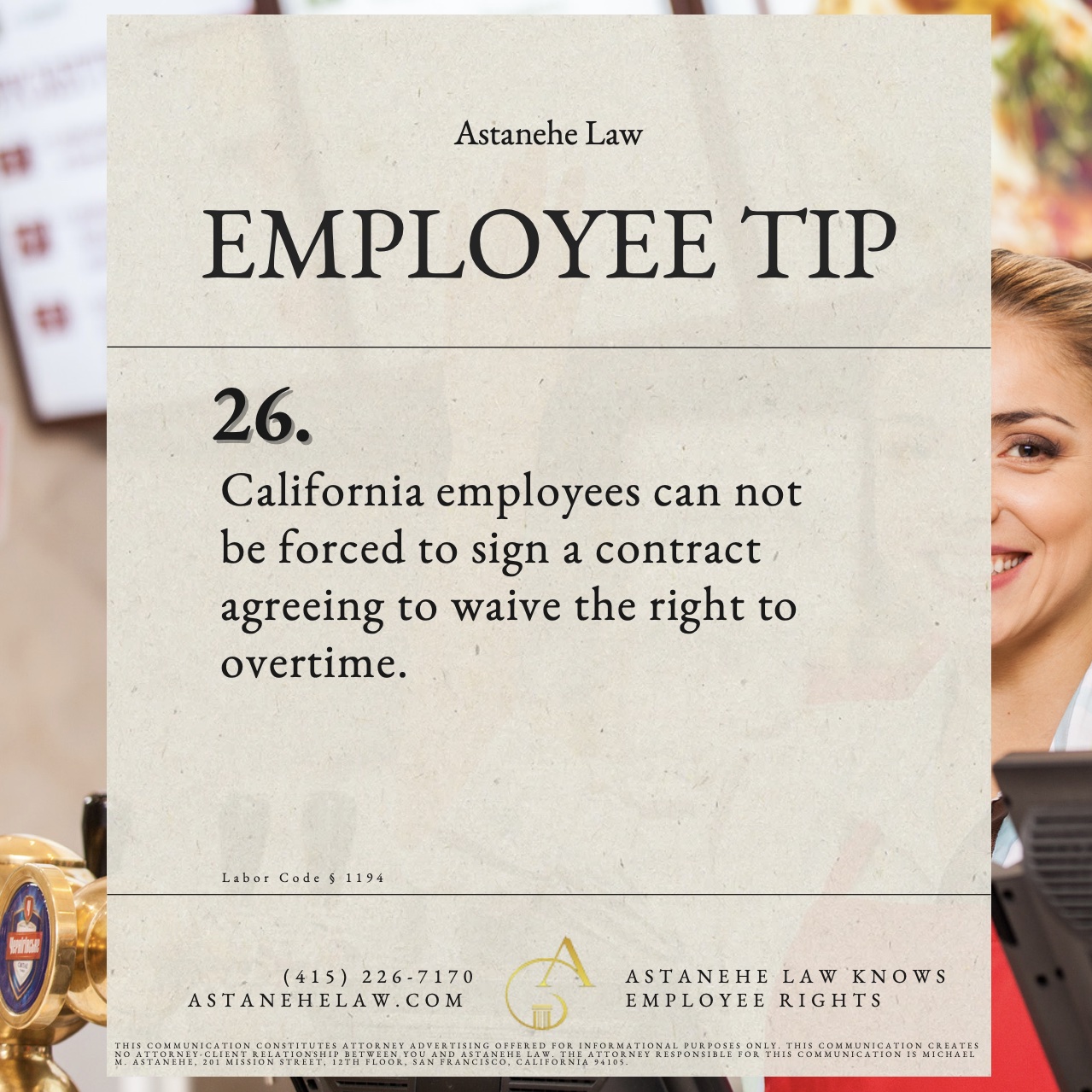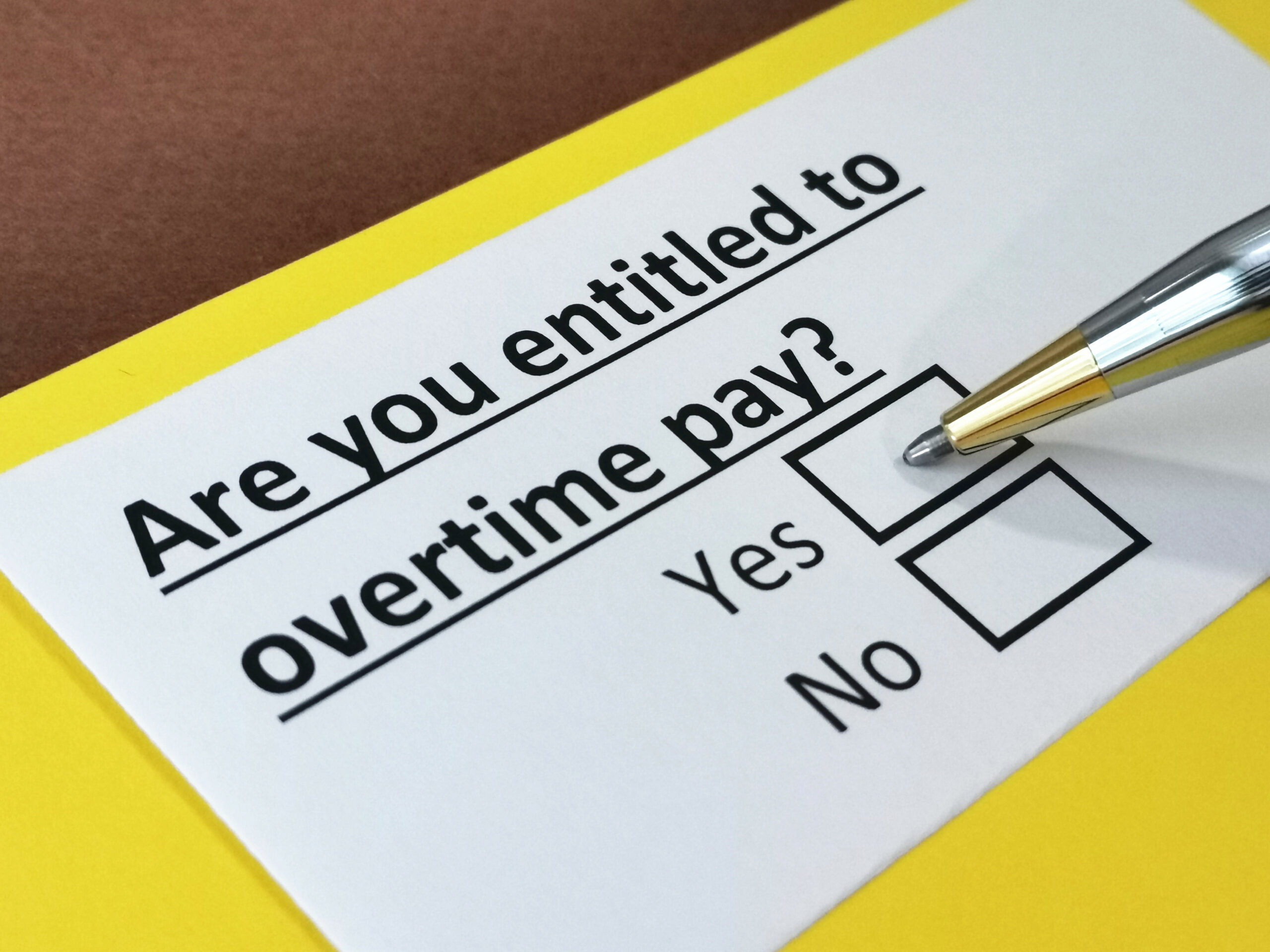Can California Employees Waive The Right To Overtime Compensation?
California law reflects the state’s strong public policy in favor of full payment of wages for all hours worked. Armenta v. Osmose, 135 Cal. App. 4th 314, 321-24 (2005). California employees are entitled to collect overtime compensation, based on a multiple of their regular hourly rate. California Labor Code § 510, et seq. Specifically, California employees are entitled to overtime pay of one and a half times the employee’s regular hourly rate for hours worked over forty hours per week or more than eight hours per day. California Labor Code § 510(a). Additionally, California employees are entitled to double their hourly rate for all work performed over twelve hours per day. Id. Overtime hours and pay must be clearly marked on written wage statements provided to California employees on pay days. California Labor Code § 226.
Can Employers Force California Employees to Waive Their Right to Overtime Compensation?
No, California employees can never be forced to waive their right to overtime compensation. California Labor Code § 1194. Any agreement to waive overtime is not enforceable. And, the employee will be protected from retaliation for refusing to agree, reporting the agreement to the proper authority at their employer or to the State of California. California Labor Code § 1102.5. The California employee is also empowered to bring a civil action to recover unpaid overtime compensation with interest. California Labor Code § 1194. Should the California employee prevail, they will also recover their reasonable attorney fees and court costs. Id. Alternatively, the California employee may elect to file their claim at the DLSE. California Labor Code §§ 1195, 1193.5.

Where a California employee elects to bring their unpaid overtime compensation claim in court, they often may also seek statutory penalties and civil penalties for minimum wage and overtime violations.
Does This Law Protect Employees Covered by a Collective Bargaining Agreement?
Yes, California Labor Code section 1194 covers California employees covered by collective bargaining agreements. Gregory v. SCIE, LLC, 317 F. 3d 1050, 1054 fn. 5 (9th Cir. 2003).
Failure to Pay Overtime Compensation is Wage Theft
An employer’s failure to pay overtime compensation is a failure to pay wages. An employer’s failure to pay wages constitutes wage theft. Wage theft is a crime.
For more information regarding California overtime laws, please visit the California Department of Industrial Relations.
Astanehe Law Knows Employee Rights
If your employer has violated your right to overtime compensation, contact Astanehe Law. Astanehe Law has experience representing California employees who have suffered California Labor Code violations, including unpaid overtime compensation. Astanehe Law represents clients on a contingency fee basis. Call us at (415) 226-7170 or email us at contact@astanehelaw.com.
Tags In
Categories
- Agoura Hills
- Alameda
- Albany
- Alhambra
- Aliso Viejo
- Alpine
- Alpine Heights
- Altadena
- American Canyon
- Anaheim
- Antioch
- Aptos
- Arcadia
- Ashland
- Atascadero
- Atherton
- Avocado Heights
- Azusa
- Baldwin Park
- Banning
- Barstow
- Bay Point
- Beaumont
- Bellflower
- Belmont
- Benicia
- Berkeley
- Beverly Hills
- Bloomington
- Bodega Bay
- Bonita
- Bradbury
- Brea
- Breach of the Covenant of Quiet Enjoyment
- Breach of the Warranty of Habitability
- Brentwood
- Brisbane
- Buena Park
- Burbank
- Burlingame
- Calabasas
- Calexico
- California Rent Control
- California Tenants
- Calimesa
- Calistoga
- Camarillo
- Campbell
- Canyon Lake
- Capitola
- Carlsbad
- Carmel-By-The-Sea
- Carpinteria
- Carson
- Casa De Oro-Mount Helix
- Castro Valley
- Castroville
- Cathedral City
- Cerritos
- Charter Oak
- Cherryland
- Chino
- Chino Hills
- Chula Vista
- Citrus
- City of Industry
- Claremont
- Coachella
- Colma
- Colton
- Commerce
- Compton
- Concord
- Corona
- Coronado
- Coronita
- Corte Madera
- Costa Mesa
- Cotati
- Crockett
- Culver City
- Cupertino
- Daly City
- Dana Point
- Danville
- Del Mar
- Desert Hot Springs
- Diamond Bar
- Discovery Bay
- Dixon
- Drawbridge
- Duarte
- Dublin
- Duncans Mills
- East Compton
- East Hemet
- East Los Angeles
- East Palo Alto
- East Whittier
- El Cajon
- El Centro
- El Cerrito
- El Monte
- El Segundo
- El Sobrante
- Elk Grove
- Emeryville
- Encinitas
- Fairfield
- Fairview
- Fontana
- Forestville
- Foster City
- Fountain Valley
- Fremont
- Fullerton
- Garden Grove
- Gardena
- Gilroy
- Glendale
- Glendora
- Goleta
- Grand Terrace
- Graton
- Greenfield
- Grossmont
- Hacienda Heights
- Half Moon Bay
- Hawthorne
- Hayward
- Healdsburg
- Hemet
- Hercules
- Hermosa Beach
- Hespira
- Highland
- Home Gardens
- Huntington Beach
- Huntington Beach Tenants
- Imola
- Imperial Beach
- Indio
- Inglewood
- Irvine
- Irwindale
- Jamul
- Jenner
- Junk Fees
- Jurupa Valley
- Kellogg
- Kensington
- Kentfield
- La Conchita
- La Habra
- La Honda
- La Mesa
- La Mirada
- La Verne
- Ladera Ranch
- Lafayette
- Laguna Beach
- Laguna Niguel
- Lake Elsinore
- Lake Forest
- Lakeside
- Lakewood
- Lancaster
- Landlord Entry
- Larkspur
- Lathrop
- Lawndale
- Lemon Grove
- Livermore
- Lodi
- Loma Linda
- Lomita
- Lompoc
- Long Beach
- Los Alamitos
- Los Alamos
- Los Altos
- Los Altos Hills
- Los Angeles
- Los Berros
- Los Gatos
- Lynwood
- Lynwood
- Malibu
- Manhattan Beach
- Manteca
- Marin City
- Marina
- Marina Del Rey
- Martinez
- Maywood
- Menifee
- Menlo Park
- Mentone
- Middleton
- Mill Valley
- Millbrae
- Milpitas
- Monrovia
- Montclair
- Monte Rio
- Montebello
- Montecito
- Monterey
- Monterey Park
- Moraga
- Morgan Hill
- Morro Bay
- Mountain House
- Mountain View
- Murrieta
- Napa
- National City
- Newark
- Newport Beach
- Nipomo
- Norco
- North Tustin
- Norwalk
- Novato
- Oak Park
- Oakland
- Oceano
- Oceanside
- Ontario
- Orange
- Orcutt
- Orinda
- Owner Move-In
- Oxnard
- Pacific Grove
- Pacifica
- Palm Desert
- Palm Springs
- Palmdale
- Palo Alto
- Palos Verdes Estates
- Paramount
- Pasadena
- Paso Robles
- Penngrove
- Perris
- Petaluma
- Pico Rivera
- Piedmont
- Pinole
- Pismo Beach
- Pittsburg
- Pleasant Hill
- Port Hueneme
- Portola Valley
- Ramona
- Rancho Cucamonga
- Rancho Mirage
- Rancho Palos Verdes
- Rancho San Diego
- Rancho Santa Margarita
- Redlands
- Redondo Beach
- Redwood City
- Release of Claims
- Rialto
- Richmond
- Riverside
- Rodeo
- Rohnert Park
- Rosemead
- Rowland Heights
- Sacramento
- Salinas
- San Anselmo
- San Bernardino
- San Bruno
- San Carlos
- San Clemente
- San Diego
- San Dimas
- San Francisco
- San Jose
- San Juan Capistrano
- San Leandro
- San Lorenzo
- San Luis Obispo
- San Marcos
- San Marino
- San Martin
- San Mateo
- San Pablo
- San Pasqual
- San Pedro
- San Rafael
- San Ramon
- Sand City
- Santa Ana
- Santa Barbara
- Santa Clara
- Santa Clarita
- Santa Cruz
- Santa Maria
- Santa Monica
- Santa Rosa
- Santee
- Saratoga
- Sausalito
- Seal Beach
- Seaside
- Sebastopol
- Security Deposit
- Sewage Flood
- Sheridan
- Sierra Madre
- Signal Hill
- Simi Valley
- Solana Beach
- Soledad
- Sonoma
- South Gate
- South Pasadena
- South San Francisco
- South San Jose Hills
- South Whittier
- Spring Valley
- St. Helena
- Stanton
- Stinson Beach
- Stockton
- Suisun City
- Sunnyvale
- Temecula
- Temple City
- Thousand Oaks
- Tiburon
- Torrance
- Tracy
- Tustin
- Uncategorized
- Union City
- Unlawful Detainer
- Upland
- Valle Vista
- Vallejo
- Venice
- Ventura
- Victorville
- Villa Park
- Vista
- Walnut
- Walnut Creek
- Walnut Park
- Watsonville
- West Hollywood
- West Sacramento
- West San Dimas
- Westlake Village
- Westminster
- Whittier
- Wildomar
- Windsor
- Woodside
- Yorba Linda
- Yucaipa
- Zee Estates
- Zzyzx




